
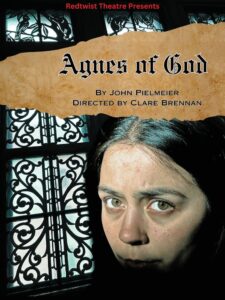 ***** The tightly focused psychological drama “Agnes of God” is both a character study and a murder mystery. Beautifully written by John Pielmeier and lovingly directed by Clare Brennan, this three-actor play is framed around the circumstances surrounding a newborn baby’s horrific death. Considering that this child was born to an extremely devout young nun, finding out who the murderer might be is one part of the equation. The other part is who the father might be and whether this particular offspring could have resulted from a virgin conception. This structure allows the playwright to pose lots of questions not only regarding matters of faith, morals, and suffering but, by extension, the relationship between religion and science within the contemporary world. Basically, the story raises many important philosophical issues: from the meaning of faith to the value of a modern psychological perspective on life. With highly controversial arguments batted about quickly and with great fervor, the show is riveting from beginning to end.
***** The tightly focused psychological drama “Agnes of God” is both a character study and a murder mystery. Beautifully written by John Pielmeier and lovingly directed by Clare Brennan, this three-actor play is framed around the circumstances surrounding a newborn baby’s horrific death. Considering that this child was born to an extremely devout young nun, finding out who the murderer might be is one part of the equation. The other part is who the father might be and whether this particular offspring could have resulted from a virgin conception. This structure allows the playwright to pose lots of questions not only regarding matters of faith, morals, and suffering but, by extension, the relationship between religion and science within the contemporary world. Basically, the story raises many important philosophical issues: from the meaning of faith to the value of a modern psychological perspective on life. With highly controversial arguments batted about quickly and with great fervor, the show is riveting from beginning to end.
Pielmeier’s original script is fantastic. But it is Brennan’s steady direction that moves the action up and down (or side to side) on such a small and intimate stage; the constant motion keeps the rather heavy and meaningful dialogue from becoming too ponderous. Brilliant performances by each of the cast members bring the dialogue to life and create incredibly deep character development. Psychiatrist Dr. Martha Livingstone (Jacqueline Grandt), a lapsed Catholic, has been appointed by the court to investigate Sister Agnes (Soleil Pérez) and her possible role in the death of her infant, considering that she gave birth to it in her room inside the convent. Yet Mother Superior Miriam Ruth (Debra Rodkin) offers considerable pushback to Dr. Livingstone’s investigation. She believes that the 21-year-old Agnes is a very strange but gentle soul, who has been entrusted into the care of the Catholic Church for the past four years and whose beautiful singing voice connects her with the angels. Mother Superior does not want to psychologically harm the young woman—and for that matter, neither does Dr. Livingstone, whose own sister Marie had earlier become a nun. In fact, both women believe that Agnes is a naïve innocent. Yet the two constantly argue with each other, having to do with their frameworks for viewing the world at-large. Hence, the show is rife with existential questions that offer us many perplexing conundrums. Has religion and its purpose changed over the centuries? Are saints and miracles applicable only to those who lived in past centuries? One truism that both Dr Livingstone and the Mother Superior seem to agree on, ironically, is that regardless of our modern belief in science, there is something about human nature that wants to believe in miracles and that they are still possible.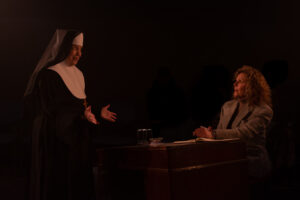
Yet the story largely focuses on trauma and how we process it, with an excellent discussion of this aspect of the script written by artistic director and technical director Dusty Brown and included within a copy of the program. While child abuse and neglect can make for suffering throughout one’s entire life, traumas can occur in any or all aspects of living, such as within bad relationships or horrific and unexplainable circumstances. The issue, then, becomes how people learn to cope with injuries from physical, emotional, psychological, or sexual abuse. Can they ever fully recover from cruelty and pain? In this play, the psychiatrist intercedes with a scientific approach not just in trying to discover the perpetrator of the murder but also as a means of remedying whatever trauma that Agnes has gone through: by bringing repressed truths and realities to the fore of her consciousness. Now without getting overly specific (and I’m not ruining anything here) was Agnes better off in fending off her demons in community or as an individual? Did she offer up a true confession of events or a false one, and does it really matter? And in a more general sense, what is the benefit of psychology versus religion in gaining insight into the human condition and relieving the depth of human suffering? And should the relief of suffering be one of the goals of religious or scientific belief?
The simple but effective set design by Rose Johnson features skewed outlines of stained glass windows on the north and south sides of a small bowling alley stage. Clever props design by Evy Burch features a slanted office desk, intentionally shortened on one side, plus a distorted wire waste paper basket. Sam Anderson, the lighting designer, has provided just the right touches at just the right moments of the show, including the silhouettes in the background. Anna Bodell’s costume design is nicely done and appropriate for this story, particularly the two types of traditional habits, one worn by Mother Superior as a professed nun and the other worn by Agnes, the novice. Last but not least, Courtney Abbott has done a fantastic job as the fight and intimacy choreographer, an essential element for this production, where there is close contact among the actors.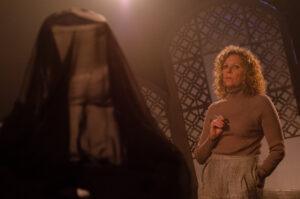
The weirdest part of the staging, however, was when mist containing incense came out of a hole on the underside of the crooked desk and rose to fill the entire room. I understand that fog can be analogous to the characters’ bewildered states of mind, and, of course, there is the traditional religious significance of the incense. But I happened to be seated right by the opening where the mist originated and became increasingly concerned that my breathing might become adversely affected. Plus, everything became needlessly foggy when far too much mist was being used in such a confined space.
Although the audience is never given enough of a respite to reflect on the deep and meaningful questions that the drama poses, this is perfectly okay: Our unease only adds to the intimacy of the performance. In a show where the casting cannot be surpassed and where all of the characters seem so authentic that you can almost touch them, every moment is a gem. The result is an outstanding production in all senses of the word. Redtwist Theatre’s revival of “Agnes of God” is an absolute must see!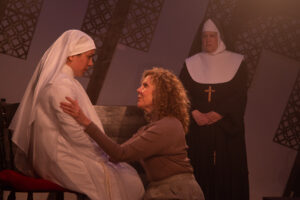
“Agnes of God” plays through July 9, 2023, at Redtwist Theatre, 1044 W. Bryn Mawr Avenue, Chicago.
Tickets: $25
Friday night tickets are pay-what-you-can.
Student, military and senior discounts are available.
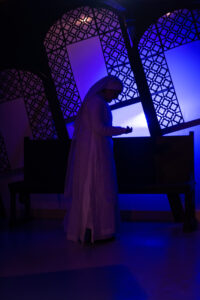
Performance schedule:
Thursdays, Fridays, and Saturdays -7:30 p.m.
Sundays – 3:30 p.m.
For more information and to purchase tickets, go to: https://www.redtwisttheatre.org/ or email reserve@redtwist.org.
Masks are required in the theatre.
To see what others are saying, visit www.theatreinchicago.com, go to Review Round-Up and click at “Agnes Of God”



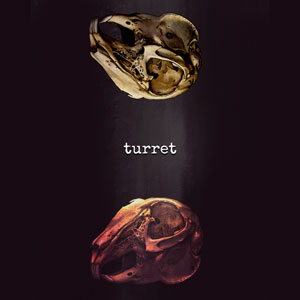


More Stories
“On The 20th Century” Reviewed by Frank Meccia
“Turret”
“Black Sunday”